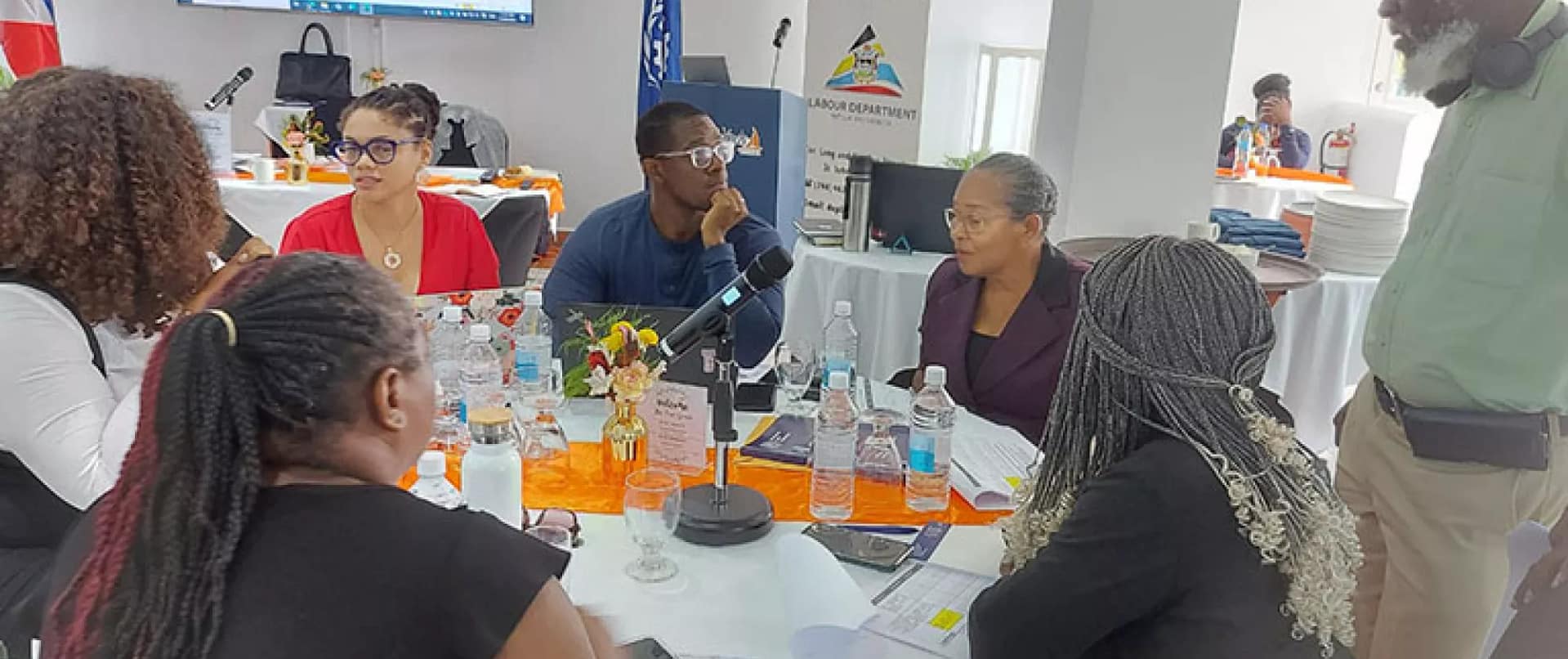
As an active member of the Regional Initiative Latin America and the Caribbean Free of Child Labour, the Government of Antigua and Barbuda is committed to strengthening its child labour prevention and elimination approaches.
This was evident as the Ministry of Legal Affairs, Public Safety and Labour collaborated with the ILO Caribbean Office to host a national stakeholder workshop from 20-21 June 2024 for the development of a country accelerated action plan (CAAP) to end child labour.
Organised with support from the ILO-Brazil South-South Cooperation Programme, the event focused on a review and application of findings and recommendations from a recent national rapid assessment of child labour, as inputs to the development of the CAAP. It also featured knowledge exchange with counterparts from the Ministry of Labour and Employment Brazil on good practices and lessons learned by Brazil in the development of evidence-based national and local policies and plans for eradicating child labour.
“Child labour remains a pressing global issue that requires urgent attention from all sectors of society. This workshop brings together experts, advocates, policymakers and other stakeholders to discuss current trends and statistics on child labour globally and locally; the impact of child labour on children, families and society; successful initiatives and programmes aimed at combatting child labour; as well as policy recommendations and advocacy strategies to promote children’s rights and wellbeing,” explained Anita Joseph, Assistant Labour Commissioner for Antigua and Barbuda, who welcomed participants to the event on 20 June.
She was joined by featured speakers that included Dr Joni Musabayana, Director of the ILO Decent Work Team and Office for the Caribbean; Natanael Lopes, Programme Officer for the Brazil-ILO South-South Cooperation Programme; Monica Salmito, Lead Analyst at the Brazilian Cooperation Agency (ABC) for the Brazil-ILO South-South Cooperation Programme, and Ms. Maureen Payne-Hyman, Legal Consultant, speaking on behalf of the Honourable Steadroy Benjamin, Attorney General and Minister responsible for Labour.
“Through the ILO-Brazil South-South Cooperation Programme, we have been able to partner with the Ministry of Legal Affairs, Public Safety and Labour to provide technical support and facilitate important knowledge sharing between the Governments of Brazil and Antigua and Barbuda, as we advance towards our common goal of achieving the first generation in our hemisphere that is free of child labour,” said Dr Joni Musabayana.
“This workshop is taking place with financing from the Brazilian Government and within the scope of the partnership between Brazil and the ILO. Brazil has a lot to contribute with Caribbean countries,” said Monica Salmito. “We can share how Brazil has progressed over the years in reducing child labour. We have done a lot and we have a lot to do.”
The collaboration is a major step forward for Antigua and Barbuda in meeting commitments within the Regional Programme for Acceleration of the Eradication of Child Labour in Latin America and the Caribbean (PRAETI), which was approved by consensus at the 8th Annual Meeting of RI Focal Points Network held in October 2022.
The design of a CAAP is one of the first strategic actions set out in the PRAETI and seeks to prioritize and make visible the most important actions that each country commits to implement in their territories in the next three years. The CAAP takes into account the particular effects of the COVID-19 pandemic and other socio-economic crises, thus contributing to the regional goals and to the fulfilment of Target 8.7 of the Sustainable Development Goals (SDGs).
During the event, ILO Brazil Programme Officer Nathaniel Lopez encouraged participants to share their ideas and experiences by explaining, “Each of you brings a unique perspective and valuable expertise to the table and your contributions are crucial to the success of this workshop, in the development of the comprehensive country accelerated action plan.”
The following day (21 June), Resel Melville, ILO Caribbean National Programme Officer and Caribbean Focal Point for the RI, provided an overview of the International Legal Framework necessary to develop effective policies aimed at the prevention and elimination of child labour. Notably, The Universal Declaration of Human Rights, 1948; The Convention on the Rights of the Child, 1989; C138 – The Minimum Age Convention, 1973; and C182 – The Worst Forms of Child Labour Convention, 1999.
“Whether or not a country has ratified, signed or declared International Standards on Child Labour, the country has an obligation to take action. We have been trying to ensure stakeholders appreciate these fundamental Conventions as a part of the body of universal human rights. That’s why they’re called fundamental principles and rights at work,” she explained.
Joana Borges, ILO Caribbean Specialist for Social Protection and Occupational Safety and Health, also spoke at the event to highlight the important nexus between child labour, social protection and occupational safety and health (OSH).
“We really need to reinforce connections or bridges particularly because this is not just about labour; this is not just about social services; this about social protection and this is about OSH and a couple more issues. So, the more we can connect the dots, the more we can connect our policies of course knowing that each of us in our own institutions have different responsibilities, but we need to ensure complementarity when we prevent and protect against child labour,” she emphasized.
Following both presentations, participants engaged in brainstorming discussions to consider and include these key issues for the development of the CAAP for Antigua and Barbuda.
Advertise with the mоѕt vіѕіtеd nеwѕ ѕіtе іn Antigua!
We offer fully customizable and flexible digital marketing packages.
Contact us at [email protected]

















Hmm… I don’t see anything indicating the proposed age to start working or hours allowed to work per day, per week…?
In the United States, which is where standards are mostly adopted from, many states require the child to apply for a work permit through their school because only the school knows that the child is in good enough standing to hold a job. This can happen from 15 years old and up and 15, 16 and 17 year old children can only work after school and weekends at a total of 20 hours a week usually, some states may allow 30 hours. This keeps them from being over worked while full time in school. Additionally, they cannot work past 9pm as the time teenagers or all children must be indoors at their HOME, is the curfew of 10pm. This is to keep them safe, off the streets, out of trouble or harms way.
These are the type of guidelines that would be helpful for children, parents, lower crime, reduce child labor abuse, and show a strict standard.
Repercussions for employers and the youth would result in jail time and community service. This will assist in enforcing the law and for those parties to take it serious. Parents included should be held responsible of their child and how much they work.
That’s true indeed!
Comments are closed.